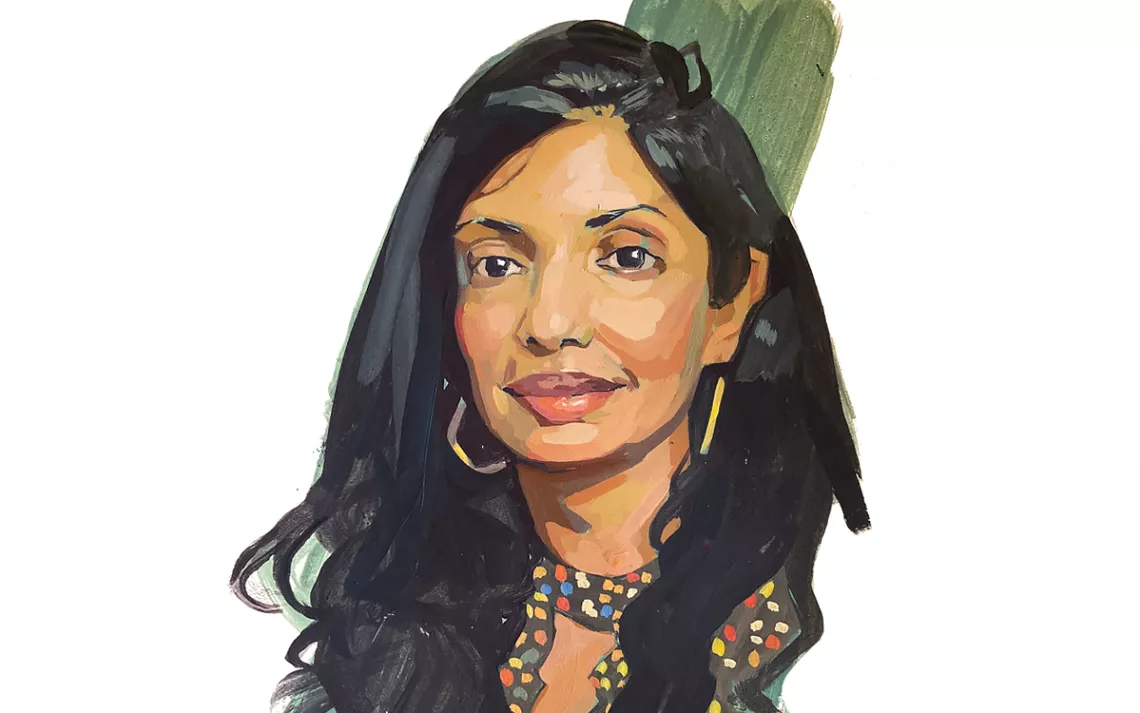Pratima Agrawal Learns by Doing
The Sierra Club volunteer has worked to get Philadelphia to commit to clean energy

Pratima Agrawal, Sierra Club volunteer, Philadelphia | Illustration By Jon Stich
After the 2016 election, I knew I wanted to do something related to the environment. The Sierra Club was launching the Philadelphia Ready For 100 campaign, so I started going to meetings. I became part of a small group that did everything from meeting with the city's Office of Sustainability to tabling at events to build community support for clean energy. In the first year, we got the mayor to agree to transition to 100 percent clean energy. After two years, the city council passed a resolution committing to the transition.
Before volunteering with Ready For 100, I really didn't have experience with local government. I learned quickly that it's one thing to have city officials sign on to these commitments, but it's another thing for them to follow through. There are a lot of competing interests in the city. You have labor unions that are pushing one set of interests. You have residents who are pushing another set. You have the utility company that is pushing its own agenda. It's a very complex problem. Philadelphia Gas Works is the largest city-owned utility company in the country, so getting it to transform into a clean energy utility company would be huge.
While volunteering with the Sierra Club, I was also teaching a middle school elective on environmental justice at the school where I work as an administrator. At the time, Philadelphia Gas Works was proposing to build a liquefied natural gas facility in South Philly. A lot of my students lived in that area. They wrote letters to the mayor, and three of them testified against the facility at a city council meeting. The city council voted to approve the LNG facility anyway. The students were disappointed that the city was not taking this issue seriously, but I think it was still a good lesson: Sometimes you win, sometimes you don't, but these things are still worth fighting for.
In summer 2019, the South Philly oil refinery exploded. There was a lot of community push to have it permanently shut down. One of my students testified at a hearing about the refinery. It did eventually close. Then 2020 rolled around and the COVID shutdown happened. I haven't been able to teach the elective since then.
These days, I am involved with HERE4CJ, a project organized by Philadelphia Climate Works. HERE4CJ stands for Housing, Equity, Repair, and Electrification for Climate Justice. It works to bring together community organizations to electrify homes, do gas-line repairs, and address other housing issues. It's an enormous barrier to achieving 100 percent clean energy when so many homes run on gas and all these old gas lines in the city leak methane. It's an equity issue—making sure that the most vulnerable residents have access to clean energy and can afford their bills while they're using that clean energy.
I hadn't done a whole lot of activism prior to getting involved with Ready For 100. I was just passionate about environmental issues. I didn't think I had the background necessary to really make a difference, but I just started asking, "What can I do?" I learned a lot by doing. As long as someone has a strong desire to make a difference, they can learn along the way. There are going to be ups and downs. It's a long process to get where you want to be. But it's worthwhile because these are high-stakes issues that affect a lot of people.
This article appeared in the Winter quarterly edition with the headline "Learning by Doing."
 The Magazine of The Sierra Club
The Magazine of The Sierra Club



